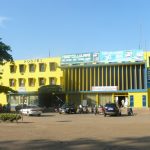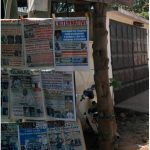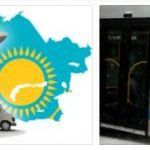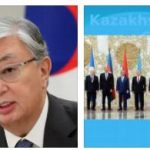According to official figures, 3,520 mass media (newspapers and magazines, radio and television stations, information agencies, internet media) were registered in Kazakhstan in 2019, the majority of which were printed matter. 16% of them appear in Kazakh, almost 25% in Russian, 36% in both languages. There is also media in several minority languages.
Nevertheless, Kazakhstan does not have a highly developed or even colorful media spectrum. Most of the print media are only of local or regional importance, appear in small numbers and are of an even lower journalistic level. Even the big, better-known daily and weekly newspapers can only be bought at certain kiosks in Almaty and Astana and have a relatively small readership.
Freedom of expression and freedom of the press have been increasingly restricted by state intervention since 2012, and legislation was tightened in spring 2014. Since July 2020, defamation is no longer a criminal offense, but those affected consider the change to be rather decorative. Critical newspapers are covered with tax lawsuits or sentenced to ruinous compensation payments, websites are blocked; critical journalists not only with words but also blows intimidated and criminally prosecuted. Also the Social networks are obviously a thorn in the side of the state. The case of the chairman of the Kazakh Union of Journalists and the National Press Club, Seitkazy Matajew, and his son, who were arrested in February 2016 and sentenced to long imprisonment and confiscation of property for financial offenses in early October 2016, marked a new low point in dealing with journalists. The judgments were judged by international organizations as politically motivated and the process condemned as unfair. (Mataev was surprisingly released on parole in November 2017.) Over 30 independent or opposition newspapers / magazines have been banned in recent years (Pravdiwaja Gazeta, Assandi Times and Adam bol and their successors Adam, Respublika). Television broadcasters (K-Plus), radio broadcasters, video portals (stan.tv) and increasingly the Internet were also affected by the restrictive policy; in the spring of 2018 Forbes Kazakhstan and the news website Ratel.kz are in the focus of government investigators advised. The owner of the critical Nakanune.kz was sentenced to prison in May 2016. The low point in dealing with the Internet is the obligation, which has existed since July 2019, to install a “security certificate” that enables the authorities to monitor. But other media / journalists have also faced increased persecution since President Tokayev took office. In August 2020, an employee of the state television quit his job with publicity in order to escape the pressure for positive reporting.
Critical media not only have a problem with censorship, but are also disadvantaged by a special state system of funding – while state media receive direct financial support. The lack of independent reporting makes the population vulnerable to rumors and fake news. While the state pays a lot of attention to the content of the Internet on the one hand, it neglects network security so much that Kazakhstan is already the preferred address for hackers.
Larger daily and weekly newspapers are also present on the www. According to dentistrymyth, the position of official Kazakhstan is represented by the Kazakh- speaking Egemen Kazakhstan and its Russian-speaking counterpart Kazakhstan Pravda (English-language version). Other national print media with political reporting (and website) are among others: Liter, Novoe Pokolenie, Vlast ‘, Exclusive. For the German minority in Kazakhstan, the DAZ, Deutsche Allgemeine Zeitung, is still published weekly in German and Russian. Tengrinews provides ongoing information on the Internet about events in Germany. The main domestic TV channels are Chabar, Kazakh TV, KTK, 7th Channel and Kazakstan.
Media from the Russian Federation are widespread and many users give them higher credibility. However, their widespread use and impact are increasingly viewed critically. It is not yet clear whether the closure of 88 foreign TV and radio stations on August 2018 will be in this context and will be final.
Telecommunications and internet
The cell phone is the most widely used means of communication. The reception is given in all large cities, but also in smaller towns along the highways. Prepaid SIM cards can be purchased at almost every kiosk. The most popular and widely used providers are Beeline, K-cell and Active. Cell phone-to-cell phone call prices are quite high compared to Germany, flat rates for both calls and data are on the rise, and SMS is also very cheap internationally.
The Internet is widespread, Internet cafes can be found everywhere, and WiFi is available in hotels and many cafes in the capital cities. The internet is not free, oppositional websites are blocked from time to time.
There are post offices in all larger towns, and they are usually open from 9 a.m. to 6 p.m. Letters travel several days within the country and up to two weeks to Germany.









